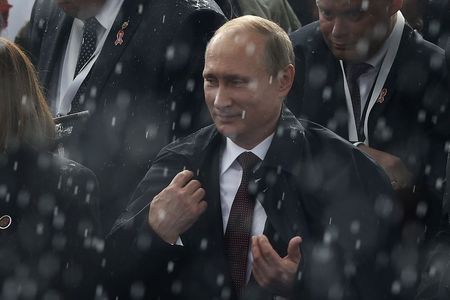By Andreas Rinke and Crispian Balmer
MILAN (Reuters) - Russian President Vladimir Putin and Ukrainian leader Petro Poroshenko are looking to patch up a faltering ceasefire in eastern Ukraine and resolve a dispute over natural gas supplies when they meet in Milan on Friday.
The pair are expected to talk one-on-one on the sidelines of a Europe-Asia summit, and hold broader discussions with EU leaders alarmed at the potential for their dispute to trigger wider international unrest.
The West has imposed sanctions on Russia for its annexation of Crimea earlier this year and its support of pro-Russian separatists fighting in the east of Ukraine, reviving memories of the Cold War hostilities of the 20th century.
European leaders arriving in Milan on Thursday appeared to put the blame on Moscow for dozens of deaths in constant violations of a ceasefire agreed by Putin and Poroshenko last month in Minsk.
"It is obviously above all Russia's task to make clear that the Minsk plan is adhered to," said German Chancellor Angela Merkel told reporters. "Unfortunately, there are still a lot of shortcomings but it will be important to look for a dialogue here."
Europe fears Russia's decision to cut gas supplies to Ukraine because of unpaid bills could threaten disruptions in the gas flow to the rest of the continent this winter and is working hard to broker a deal.
Russia is Europe's biggest gas supplier, meeting around a third of demand, and the European Union gets about half of the Russian gas it uses via Ukraine.
The stand-off over pricing is the third in a decade between Moscow and Kiev, though this time tensions are higher because of the fighting in eastern Ukraine.
"HOPEFUL"
Kiev and its Western backers accuse Moscow of aiding a pro-Russian separatist revolt in eastern Ukraine by providing troops and arms. Russia denies the charges but says it has a right to defend the interests of the region's Russian-speaking majority.
Launching the Milan diplomacy, Merkel saw Poroshenko on Thursday evening. "The meeting went very well and we have seen a great demonstration of support for Ukraine," the Ukrainian president told reporters afterwards.
Putin warned on Thursday that Russia will reduce gas supplies to Europe if Ukraine steals from the transit pipeline to cover its own needs, although he added that he was "hopeful" it would not come to that.
"I can reassure you that there will be no crisis that could be blamed on Russian participants in energy cooperation," Putin told reporters during a visit to Serbia. But, he said, "there are big transit risks."
Germany is Europe's biggest buyer of Russian gas, paying Russian exporter Gazprom around $15 billion a year. EU members such as Bulgaria and Slovakia are almost entirely reliant on Russian gas imported via Ukraine.
Vygaudas Usackas, the EU's ambassador to Russia, said earlier this week there were "positive signs" that a deal might be within reach.
"It seems like we are entering a more promising and positive chapter of the whole puzzle about the crisis in and around Ukraine," he told Reuters.
However, it was not clear how much progress might be made in finding a lasting answer to the eastern Ukraine conflict.
More than 3,600 people have died in the area since fighting broke out in mid-April when armed separatists declared they were setting up their own state.
Although Putin announced this week that Russian troops near the border with Ukraine would be pulled back, Western officials want to see clear evidence that Moscow is acting on this.

Italian Prime Minister Matteo Renzi will host Friday's meeting, which will also be attended by Merkel, French President Francois Hollande and British Prime Minister David Cameron as well as Herman Van Rompuy, the chairman of European Union leaders, and EU Commission President Jose Manuel Barroso.
(Additional reporting by Elizabeth Pineau and James Mackenzie in Milan, Alexei Anishchuk in Moscow and Pavel Polityuk in Kiev; Editing by Ruth Pitchford)
